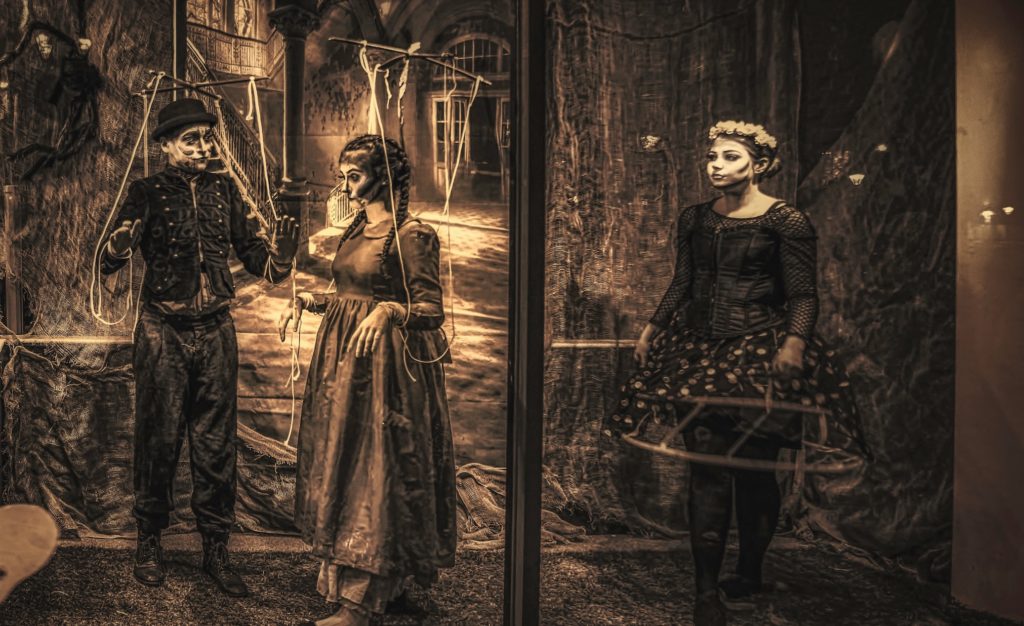You would think that something attached to threads moves in a jerky manner that resembles Pinocchio’s clumsy walk, but her movements are smooth and graceful, which makes her presence far more terrifying. What’s more, she has no childlike naivety or innocence, and she has no desire to become human. At least to my knowledge, she does not.
I am unsure of when she appeared, but when I noticed, it is as though she has been there all along like a familiar stranger. However, she is far from a welcomed friend. I see her daily, but I refuse to give her a name. They say that names create attachments, though I don’t believe I would become attached to her in any way. I name her Etta in the end.

Wherever I go, Etta follows. She does not walk or trail behind me. Instead, she appears in each room I enter. We are inseparable, though not of my own choice, of course. The only place that Etta does not follow me is to work. Yet, I often find my mind drifting to Etta’s skeletal figure when I overhear the supervisor yelling at one of my coworkers for being incompetent. Etta’s fingers would click against my laptop keys when I stop to take a break. I watch the tight, smooth grey skin pulled over each finger and the threads that move each finger rhythmically across my keyboard. Only her fingers appear, and the rest of her body is missing. As I said before, she never follows me to work. At least, not in full form.
I come home one night after drinking with coworkers. Etta sits by the stairs with her knees drawn together. She had one of her elbows propped on top of her knee. Her slim fingers cup the concave hollow of her right cheek; her shriveled purple lips drew together tighter than usual. I often wonder whether she is breathing, but I dare not check, for I fear the proximity. I imagine that her breath is like the rotting flesh of livestock meat that I often throw at the end of the week. Does she have a tongue? Can she speak? Perhaps she does not have a tongue. She has been quiet since the first day I saw her hunched in the corner of my room. Threads are attached to each body joint and disappear a meter or two into space above her head. Her head is left free, or so it seems. She resembles a small child in a grown body. I often feel the need to protect her, but I somehow knew that I could not. I wonder who pulls her threads. Why does she follow me when I am not the one controlling her?
At first, I was afraid. What if I woke up to Etta’s ghastly face looming over mine as I slept? What if I felt her breathing down my neck as I moved around the house? What if her raspy gasps mixed with the sound of the stove fan as I cooked? She does none of these things. Soon, I lost fear in this once terrifying figure. She became something normal because she is in the same place in every room I am in: a designated spot. I never worry about her disappearing because she never does. Sometimes Etta resembles a spider caught in between her web; she pulls and pulls, but she never loosens herself from the threads. It is when I am eating, when this happens most. I lift my fork. Pull. Sink it into an excessive amount of pasta. Pull. Draw it to my lips. Pull. The mouthful disappears in a second, although I do not chew it well enough. I am now used to Etta, but that didn’t change the fact that I always try to finish my meal quickly so I would not have to see her from the corner of my eye any longer.
Etta becomes less graceful the longer she stays with me. She once looked like a dead bride as she glided down the halls when I wasn’t home. I always watch her through a small opening at the side of the front door before I enter the house. When I finally muster up the courage the open the door, she is suddenly sitting on the lowest step at the bottom of the staircase, waiting. Now, her actions are jerky, and she no longer waits for me, sitting in an upright position, but slouches over her knees instead.
Some days, I see her walking down the hall with each strand of her hair attached to a new thread above her. Some days, her hair is down. Some days, she has no hair at all. Those are the days I dread the most. Her scalp is horrifying. It is red or irritated in the way my scalp looks when it is peak season at work. There are needle-sized pricks indented in her scalp where the hair is supposed to be. I think the threads pull them out. But of course, aren’t we all lucky that hair grows back quickly; though this is especially true for Etta—her hair grows back the following day. I couldn’t decide if that is a blessing or a curse.
One day, I notice Etta is appearing in different spaces around the house. I can no longer find her in her designated spot. Rather than the corner of my room, I find her sitting in a contorted position in my closet. I look at the snug sweater tangled in her threads. Etta is clutching the neckline of the sweater tightly between her skeletal fingers. I look away and see my usual opaque, white dress shirt and formal grey slacks untouched by her. I shut the closet door, but not before my eyes meet her sockets. What little grey flesh Etta has on her is melting away. She now consists of patches of both white and grey, bone and flesh. There are holes in her lips and bald spots on her scalp beneath scattered clumps of hair.
On Friday nights, I venture to release the snug sweater from Etta’s grasp. I try not to touch her as I untangle the sweater from her threads, and with a swift tug, remove it from her fingers. Even as I arrive for a blind date at the bar, Etta now follows and stands right behind my date’s head, staring at my sweater. I suddenly feel exposed and cross my arms over my chest for the rest of the night. My date returns none of my calls.
Sometimes I wake in the middle of the night to use the bathroom. I see Etta’s threads pull upwards towards the ceiling whenever my phone lights up with another email from work. Her legs would dangle in the air. My throat closes because I think she is dead if she wasn’t already, but then the threads loosen, and Etta’s feet are once again on the ground once I send a reply to the email. The next day, rather than my coworker, I am the one my supervisor yells at. Etta is behind my supervisor. Threads now pull, pull, pull at her head; her hair dip up and down with the skull it is attached to. With each dip, a few strands of hair fall out, and the skin of her face also pulls upwards, making her feature appear sharp and angular but above all, grotesque. It seems as if she agrees with my supervisor and all the insults that he yells at me. I know she is not.
They fired me that day. At night, Etta does something that she has never done before—she dances. She draws me in and forces me to dance with her. Grey ashy hands in warm flesh, clutching tightly like how she clutched the neck of my sweater and clutched tightly like the resignation letter held in my hands as I stood in front of my supervisor as he yelled a string of incoherent profanities. We twirl down the hallway, and as we dance, it appears to breathe life back into Etta. The bald spots spout new strands of hair, and the missing parts of her flesh replaced with peach colored skin. Though her cheeks are still concave and her eyes are still hollow, her now full lips draw a close-mouthed smile. When we stop, I do something that I never dared to do before; I take out the scissors that hide in my pocket, surprising Etta. I smile as I reach up and run the blade of the scissors through all her threads. By now, she must have accumulated millions. I expect her body to fall to the ground as the threads fall around her, but she stays standing amongst the pool of limp threads. My heart stops as I look above her head. The threads slowly rise to their original position. Etta shakes her head. She takes my hands in hers, the one with the scissors, and guides it above my head. I look up and notice the threads above me, tangled and threatening. My eyes widen as she mimics my previous actions and guides the blade across the threads.

